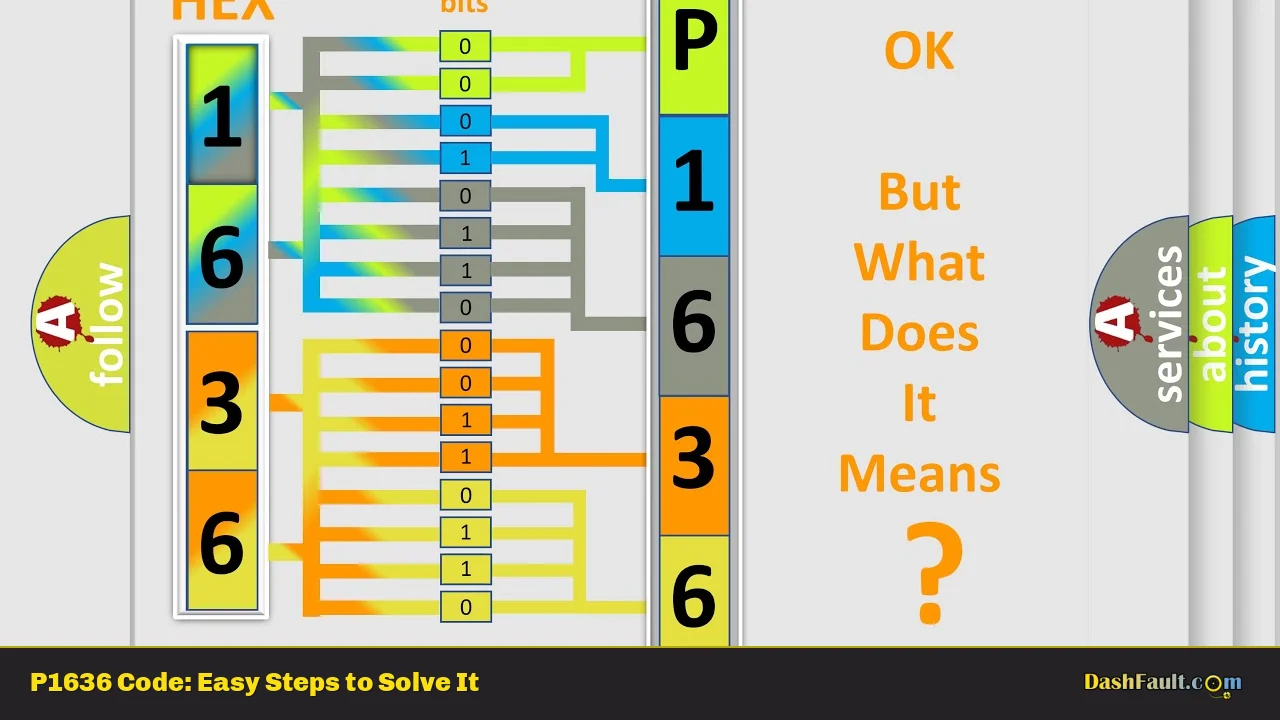The P1636 trouble code is a diagnostic trouble code (DTC) that indicates a communication failure between the Powertrain Control Module (PCM) and the inductive signature chip. This chip is responsible for monitoring the electrical signals from various components such as coils, solenoids, and relays, ensuring they operate within expected parameters. When the PCM loses communication with this chip, it can lead to various performance issues in the vehicle, including erratic engine behavior and reduced drivability.
| P1636 Code Meaning | P1636 Code Common Causes |
|---|---|
| Inductive Signature Chip Communication Error | Faulty Powertrain Control Module (PCM) |
| Loss of communication with inductive signature chip | Damaged wiring or connectors |
| Potential internal PCM failure | Faulty inductive signature chip |
| Possible software issues in PCM | Electrical shorts or opens in the circuit |
| Inductive signature chip malfunction | Corrosion or damage to connectors |
Symptoms of P1636 Code
When the P1636 code is triggered, drivers may experience several symptoms, including:
- Check Engine Light: The most common indication that something is wrong.
- Poor Acceleration: The vehicle may feel sluggish or unresponsive during acceleration.
- Stalling: The engine might stall unexpectedly, especially when idling or during slow speeds.
- Erratic Engine Behavior: This could manifest as bucking or hesitation during driving.
- Reduced Fuel Efficiency: A drop in fuel economy may occur due to improper engine management.
Technical Explanation of P1636 Code
The P1636 code indicates that the PCM has lost communication with the inductive signature chip. This chip plays a crucial role in monitoring various electrical components by analyzing their current and voltage waveforms. The PCM expects these signals to conform to specific patterns; when they deviate, it triggers the P1636 code.
The communication loss can be attributed to several factors:
- Internal PCM Failure: The PCM may have internal faults preventing it from processing signals correctly.
- Wiring Issues: Damaged or corroded wiring can disrupt communication between the PCM and the inductive signature chip.
- Chip Malfunction: If the inductive signature chip itself is faulty, it will fail to send accurate signals to the PCM.
Step-by-Step Diagnosis
Diagnosing a P1636 code involves several steps:
- Scan for Codes: Use an OBD-II scanner to confirm the presence of the P1636 code along with any other related codes.
- Visual Inspection: Check wiring and connectors associated with the PCM and inductive signature chip for signs of damage or corrosion.
- Test Voltage and Ground: Use a multimeter to ensure that the PCM is receiving adequate power and ground connections.
- Check Inductive Signature Chip Functionality: If accessible, test the inductive signature chip for proper operation.
- Inspect PCM: If all else fails, consider testing or replacing the PCM itself.
Solution Methods
Resolving a P1636 code typically involves one or more of the following solutions:
- Repair Wiring Issues: Fix any damaged wires or connectors that may be causing communication problems.
- Replace Inductive Signature Chip: If this component is faulty, replacing it may resolve the issue.
- Reprogram or Replace PCM: If the PCM is determined to be faulty, reprogramming may help; otherwise, replacement might be necessary.
- Software Updates: Ensure that the vehicle’s software is up-to-date as manufacturers occasionally release updates that can resolve communication issues.
Cost Estimates
The cost to address a P1636 code can vary widely based on several factors:
- Wiring Repairs: Minor repairs might cost between $50 and $150 depending on labor rates in your area.
- Inductive Signature Chip Replacement: This could range from $100 to $300 depending on part availability and labor costs.
- PCM Replacement: Replacing a PCM can be significantly more expensive, typically ranging from $400 to $1,200 including parts and labor.
Warnings and Recommendations
- Professional Help Recommended: If you are not comfortable diagnosing or repairing electrical issues, it’s advisable to seek professional assistance.
- Safety First: Always disconnect your battery before working on electrical components to prevent shorts or shocks.
- Do Not Ignore Symptoms: Ignoring a P1636 code can lead to further vehicle damage or safety issues while driving.
Frequently Asked Questions About P1636
- What does a P1636 code mean?
The P1636 code indicates a communication error between the Powertrain Control Module (PCM) and an inductive signature chip. - Can I drive my vehicle with a P1636 code?
It is not recommended to drive your vehicle with this code as it can lead to performance issues and potential safety hazards. - How much does it cost to fix a P1636 code?
The cost can range from $50 for minor wiring repairs up to $1,200 for replacing the PCM. - What are common symptoms of a P1636 code?
Common symptoms include poor acceleration, stalling, check engine light illumination, and erratic engine behavior. - Is it safe to ignore a P1636 code?
No, ignoring this code can lead to further mechanical issues and unsafe driving conditions. - How do I reset a P1636 code?
You can reset the code using an OBD-II scanner after addressing the underlying issue; however, if unresolved, it will likely return. - Can I fix a P1636 code myself?
If you have experience with automotive electrical systems, you may attempt repairs; otherwise, professional help is advised. - What should I check first when diagnosing a P1636 code?
The first step should be checking for any visible wiring issues or connector damage related to the PCM and inductive signature chip.
In conclusion, dealing with a P1636 trouble code requires careful diagnosis and understanding of vehicle electronics. By following systematic troubleshooting steps and addressing any identified issues promptly, vehicle owners can effectively manage this error and restore their vehicles’ performance. Always consider professional assistance if you are unsure about any aspect of diagnosing or repairing your vehicle’s systems.
